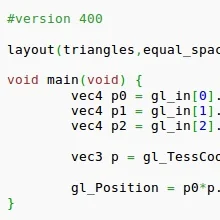OpenXR 0.90 Released For AR/VR Standard - Monado Is An Open-Source Implementation

The OpenXR 0.90 provisional specification is now available today. Yes, v0.90 and not 1.0... This caught me by surprise too when being briefed last week. This provisional specification ended up incorporating not only VR support but also AR (augmented reality) into the design. They are hoping for more feedback from AR/VR developers before officially declaring 1.0 especially with the AR support squeezing in when originally they only anticipated to get that in post-1.0.
OpenXR 0.90 provides a unified interface for high-performance access to VR and AR devices. Khronos is announcing, "The OpenXR 0.90 provisional release specifies a cross-platform Application Programming Interface (API) enabling XR hardware platform vendors to expose the functionality of their runtime systems. By accessing a common set of objects and functions corresponding to application lifecycle, rendering, tracking, frame timing, and input, which are frustratingly different across existing vendor-specific APIs, software developers can run their applications across multiple XR systems with minimal porting effort—significantly reducing industry fragmentation."
Also quite exciting is that Collabora is shipping today an open-source implementation of OpenXR dubbed Monado. Monado is an open-source OpenXR implementation that will work with devices supported by the OpenHMD initiative. Monado is quite exciting as normally we aren't used to seeing same-day, open-source implementations of new Khronos specifications - the first time seeing that was with Vulkan and the Intel ANV driver while further back open-source implementations have always lagged behind.
Meanwhile other vendors are getting ready to ship their OpenXR implementations including Microsoft with the HoloLens 2, Facebook with thew Rift/Quest platforms, etc. Game developers like Epic Games are also preparing their OpenXR support within the likes of Unreal Engine 4.
OpenXR 1.0 will likely be officially released later in 2019. Post-1.0 they are also working on the optional device interface for OpenXR, but that may still slip into v1.0 as an extension add-on.
More details on OpenXR should be up this morning on Khronos.org.
9 Comments

